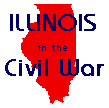

Teacher - Lawyer - Statesman - Soldier
Thanks go to Wilson DeCamp [wilsond212@aol.com
, 8523 Tysons Court, Vienna, VA 22182], who suggested the addition of his
ancestor, Robert L. Wilson, and supplied the following article, extracted from the
1877 "History of Whiteside County, Illinois". Wilson relates a family
legend that, on one occasion, Abraham Lincoln borrowed Robert L. Wilson's
wife's favorite horse for a campaign trip.
If you're researching Wilson or Kincaid families from Sangamon County, contact
Wilson DeCamp at the above address.
ROBERT L. WILSON was born September 11, 1805, in Washington County, Pennsylvania. He is of Scotch-Irish extraction, his ancestors having emigrated from Scotland and settled near the city of Belfast soon after the conquest of land by Cromwell, in the Sixteenth Century. In 1778 they settled in York county, Pennsylvania and in 1782, the father and mother of the family, with ten children, emigrated to the then far west and settled in Washington county, Pennsylvania. The journey was made, and goods transported, upon pack horses over the mountains, there being no roads. This mode of travel was slow and painful.
The Wilson family again emigrated in 1810 to near Zanesville, Ohio. This journey was made by pack horses. The subject of this sketch, then five years of age rode a pony. Col. Wilson's father died when he was seventeen years of age and left him without patrimony, and only his own resources. The young man determined to secure an education. He attended the imperfect winter schools of the neighborhood and advanced far enough to read the testament and write imperfectly. Continuing in school until he was nineteen he became qualified to teach, and taught during the winter, and attended school three years, when having an outfit of books and clothing and twenty-seven dollars in money, he started afoot to New Athens, Ohio, and by dint of hard study during the terms of school, and teaching through vacations, he finished the curriculum of Franklin College, Ohio.
At the close of his school days he went to Kentucky and taught an academy at Sharpsburg. While teaching here he read law and rode six miles each Saturday to recite to Judge Robbins. He passed a successful examination and was licensed to practice under the laws of Kentucky in the fall of 1833. March 28, 1833, he was married to Eliza Jane Kincaid.
He emigrated to Illinois and landed at Beardstown November, 4, 1833, settling near Springfield, where he taught his last schools.
In August, 1836, he was elected one of the seven Representatives from Sangamon county. Two Senators were also elected, who with the Representatives, were known as the "Long Nine." This delegation were all Whigs, and their united height was fifty-four feet--an average of six feet each. The Senators were Archer G. Herndon and Job Fletcher. The Representatives were Abraham Lincoln, Ninian W. Edwards, John Dawson, Andrew J. McCormick, Dan Stone, (afterwards Judge of the Sixth Judicial Circuit in which this county was included), Wm. F. Elkin, and R. L. Wilson. Col. E. D. Baker (afterwards United States Senator from Oregon, and killed at Ball's Bluff) was elected to fill the vacancy of Dan Stone. The specialty of the "Long Nine" was the question of removal of the State seat of Government from Vandalia to Springfield, and in this they succeeded. [See Notes [1]]
In March, 1840, Col. Wilson removed to Sterling, and his family followed the succeeding year. Soon after his removal to Whiteside [County], he was appointed Clerk of the Circuit Court, which position he held from April, 1840, to December 1, 1860. During fourteen years of this time he was Recorder of Deeds, and for eight years was Probate Justice.
In the spring of 1861 he was in Washington City when Fort Sumter was fired upon, and enlisted as a private in a batallion of volunteers commanded by Cassius M. Clay, and known as the "Clay Guards." This organization numbered about 400 men, principally non-residents, and were armed with breech-loading carbines from the Arsenal by the War Department. This body of men acted as night police, and were instrumental in preventing the city from falling into the hands of the rebels. Upon the arrival of the Seventh New York, 1,500 man strong, with a six gun battery, the "Clay Guards" were disbanded, and the discharges signed by President Lincoln and Secretary Cameron.
Col. Wilson then returned to Sterling and assisted in raising Company A, 34th Illinois Regiment, and was elected Captain but declined in favor of Lieutenant Edward N. Kirk, afterwards Brigadier General. [See Notes [2]]
In July, 1861, he called on President Lincoln and tendered his services in any capacity where he could be useful. Mr. Lincoln informed him that he had made a list of his old friends whom he desired to appoint to office, and said "now, Colonel, what do you want?" He answered--"Quartermaster will do." Mr. Lincoln replied, "I will appoint you a Paymaster." The appointment was made August 6th, and confirmed by the Senate the next day. He was placed on duty at Washington, made payments on the Potomac, and at his own request was transferred to the West, with headquarters at St. Louis. He continued in the service four years and four months, when he was honorably mustered out with the certificates of non-indebtedness signed by the Second Auditor and Second Comptroller of the Treasury. During his term of service Col. Wilson disbursed $7,000,000, and paid over 100,000 men. [See Notes [3]]
Contact the webmaster
Web Hosting donated by: Infobahn Outfitters, Inc.
This document: http://legacy.outfitters.com/illinois/history/civil/wilson-rl.html
Last update: Monday, 02-Oct-1995 09:01:14 CDT